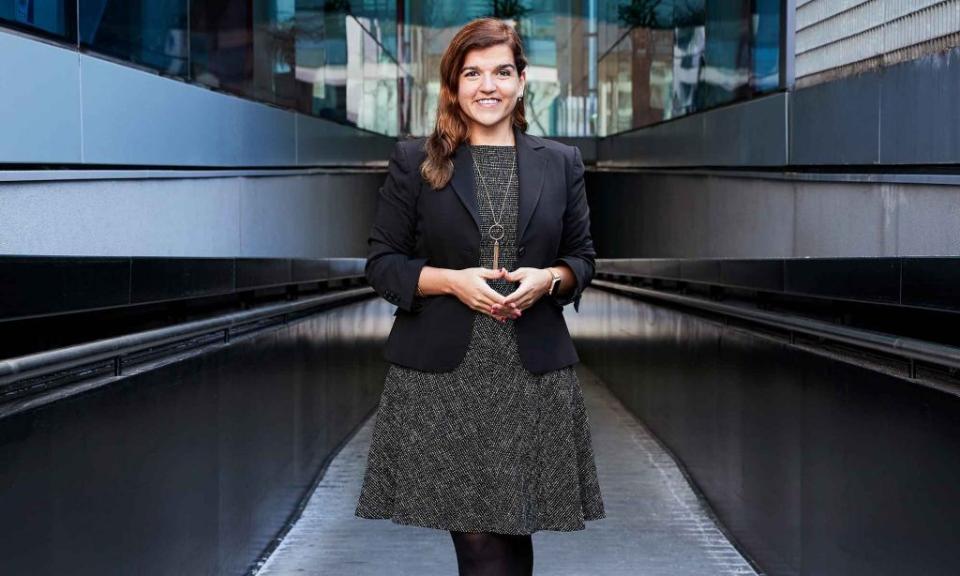
Published
Blog type
As champions of diversity and gender parity, we’re lucky to have so many incredible women at Imperial College Business School. International Women’s Day gives us the opportunity to shine a light on some of the women who are current and future changemakers in their industry.
This year’s International Women’s Day theme is #BalanceforBetter. This week we are celebrating the progress we have made thus far, but also acknowledging that balance drives a better working world and is an issue that involves us all. It is a call to action for every one of us to continue to build a gender-balanced world, both from her and him.
All of the women at the Business School have their own story to tell. While we would like to share all of these with you, we have narrowed it down and profiled a few of the remarkable staff and faculty members, students and alumnae at the Business School.
In keeping with this year’s official theme #BalanceforBetter, they each share their top tip to achieve gender parity.
Leila Guerra, Associate Dean of Programmes
Leila directs and oversees Imperial College Business School’s programmes marketing and recruitment, admissions, programme management, EdTech and careers services for over 1400 students. Prior to Imperial, she served as Executive Director for Early Career Programmes at London Business School and as Director of Innovation at IE Business School in Madrid, from which she also holds an Executive MBA.
What barriers have you faced, as a woman, in becoming successful in your field? How did you overcome them?
As with many other women, over the years I’ve faced internal and external barriers that could have become an obstacle or slowed down my professional and personal progression. I have worked in male-dominated industries, where you had to work hard to ensure your voice was heard and respected. I’ve never been a shy one when it came to speaking up or claiming my ground, but made always sure facts, solutions and/or results spoke for me. If the fact that I was a woman was an issue for someone, I would just ignore it and keep doing my work, but also continue being vocal about my successes.
If I look back at the last 20 years, my main frustrations nonetheless came from situations where an entrenched belief of how I “should” behave/react as a professional woman contradicted what I felt was the right way forward for me. My gender seemed to define me, and outweigh my skills, or leadership style. Sometimes this happened with the best intentions meant to address exactly the feared gender discrimination and ensure success. For example I was told “don’t smile so much in meetings”, or “be bold about how you dress or the shoes you wear”, “don’t speak too much about your kids”, etc. Specific traits traditionally linked to women that I was supposed to avoid to be considered peers with my male colleagues and progress in my career. Don’t get me wrong, they are sometimes useful pieces of advice, and of great help for some. But in my case, it created unnecessary pressure, as I was trying to define myself via how I thought others saw me, and not how I actually was.
I overcame this pressure mostly by understanding that companies hired me for who I was, not for who I thought they wanted me to be. I observed women and men around me who had been successful and I admired, and noticed, that their biggest success factor was that they were comfortable with who they were and their leadership style. It took some time, but I made peace with the fact that I didn’t have to do a fundamental identify shift. I still want to enhance, evolve and learn every day, but overall I’m comfortable with my own identity and sense of self as a leader…and yes, I still smile a lot!
What is your top tip to #BalanceforBetter as a woman in business in 2019?
I have five pieces of advice:
- Be yourself, be authentic and be powerful!
- We can’t do this on our own. This is not only a women’s fight, we all deserve and should strive for a balanced world.
- Speak up, no one is better placed to represent your views than yourself. But be kind, you can still express your opinions clearly and boldly in a kind manner.
- Let’s address those unconscious biases, stereotypes and unseen barriers one by one. We all have them and we can address them.
- And finally, dream big. Let’s push ourselves and take action.

Carol Propper CBE, Associate Dean of Faculty and Research, Chair in Economics
Carol is a Professor of Economics at Imperial College Business School in the Management Department. In 2010, Carol was awarded a CBE for her services to social science. The accolade recognises Carol’s research into public economics and economics of health care, as well as her work with colleagues from other social science and medical disciplines. In 2014 she was elected as a fellow of the British Academy, and in 2018 was made an International Fellow of the National Academy of Medicine.
What barriers have you faced as a woman in becoming successful in your field? How did you overcome them?
When I started an academic career in economics there were very few women in my field in the UK. So I didn’t really have any role models. But over time the few women in the profession got together and raised awareness of the issue. At first, I think it was seen as a slightly annoying activity by a group of people who weren’t really very good, but this view changed. Gradually more women were both hired as young economists and also promoted to full professorships. It’s been a slow process, but what is clear to me is that having more women in academic departments does change the dynamics. I think attitudes towards women have changed a lot, as has the behaviour of men in the profession, but there’s a way to go as lots of us have strong implicit biases.
What is your top tip to #BalanceforBetter in 2019?
I think understanding implicit biases is really important and it’s also important to speak out when injustice is done.
Sarah Ranchev-Hale, Assistant Director of Careers, Employer Relations
Sarah manages a team of Employer Relations Executives who work hard to connect employers to Business School talent, helping to put our students on the path to their dream career. Prior to her role at Imperial, Sarah worked at Morgan Stanley as the Campus Attraction Manager for the EMEA region where she engaged with top universities to attract first-class student talent to the firm. Sarah has also worked in a number of universities and business schools including London Business School, the University of Westminster and City University.
What barriers have you faced, as a woman, in becoming successful in your field? How did you overcome them?
It’s not industry specific, but likely something that will resonate with many women – lack of self-belief. Not quite believing that you deserve that opportunity, that promotion or that praise, and deselecting yourself from the conversation. I have tried to overcome this by surrounding myself with people in my personal and professional life who prop me up and give me energy, rather than pull me down. They make me believe in myself, push me when I think I’m not good enough and make me believe I can do anything!
What is your top tip to #BalanceforBetter as a woman in business in 2019?
Tell people when they have done a good job – I don’t think we do this enough, it helps build that self-belief that you deserve to be part of the conversation.
Katia Fox, Full-Time MBA and Forté Scholar
Katia is a student on our Full-Time MBA, class of 2018-19, and recipient of a Forté Foundation Scholarship. Katia was awarded this scholarship to recognise her strong leadership skills and commitment to helping women achieve their career potential. Prior to Imperial College Business School, she was a Consultant at Ceridian in Canada. Aside from her MBA studies, she is heavily involved in the Business School as a Student Ambassador, Academic Leader of the Student-Staff Committee, Head of Marketing at the Technology, Media and Telecommunications Club and Communications Manager at the Healthcare Club.
What barriers have you faced, as a woman, in becoming successful in your field? How did you overcome them?
I think the largest barrier I’ve faced as a woman in the tech industry was gaining the respect of certain male co-workers and higher-ups. This challenge of being seen as an equal, and thus having a voice in important conversations, seemed to come from the subconscious existence of a “boys club” amongst some peers. Important discussions were private, either in closed group chats or after work over beers. This made it difficult for any female co-worker, including myself, to be part of these conversations and thus have influence and feel valued. The best way I found to overcome this was to proactively engage co-workers in discussions around important decisions, rather than wait for them to be brought up. By setting up meetings and team chats myself, I was automatically part of the narrative. Taking this initiative seemed to change the way certain peers viewed my contribution to the team, and over time led to much more open and inclusive conversations.
What is your top tip to #BalanceforBetter as a woman in business in 2019?
It is easy to lean on other women in your career and I myself have found that my close colleagues and mentors have primarily been women. As a result, neither I nor most of my female peers were reaching out to male managers and executives. This only served to perpetuate the gender imbalance of middle and top tier management, as those who did form connections across the male-dominated decision-makers (mainly male colleagues) tended to rise through the ranks much quicker.
Likewise, I more readily made myself available as a mentor for more junior women, as did several female managers. This meant that men in more junior positions weren’t given as much of an opportunity to work or connect with strong female leaders. Those who did have this opportunity became champions of female colleagues’ promotions and overall successes, and continued to do so as they moved into more senior roles.
So, my advice to everyone is to actively open yourself up to mentors and mentees of different genders. To successfully #BalanceforBetter, there is no sense in separating ourselves – we must all work together, learn from one another, and push each other towards a more balanced, and better, world.

Changavy Kajamuhan, Intercalated BSc
Changavy is a student on our Intercalated BSc programme. She is taking a year out of her Bachelor of Medicine, Bachelor of Surgery (MBBS) at Imperial College London to develop her business knowledge at the Business School. Changavy has made it to the finals of the WE Innovate competition, Imperial’s flagship female entrepreneurship education programme which supports the next generation of women entrepreneurs to accelerate their startups. She will be showcasing her startup Tommy, a non-invasive and affordable continuous glucose monitor that revolutionises how patients with diabetes manage their disease.
What barriers have you faced, as a woman, in becoming successful in your field? How did you overcome them?
Although we are making progress towards minimising external obstacles to female empowerment, for example by promoting women in leadership roles, I believe the barrier we need to overcome first and foremost is very much internal to us. For example, in the field of technology, which has traditionally been male-dominated and one where we still see more male students than females, we can be seen to lack the self-confidence and drive that men have. I have seen girls lower their aspirations in this field because of how they perceive themselves in relation to our male colleagues.
I have been privileged to have parents who have loved and nurtured me from the very beginning, and sacrificed their own comforts for my education. A good education, compounded with the equal opportunities I’ve received at Imperial, has given me the courage to aspire higher, to assert my ideas, and to push the boundaries of my comfort zone to develop the self-confidence I now have. My experiences have allowed me to internalise the fact that my ideas are equally valid, and I have every right to have high aspirations in my chosen field.
What is your top tip to #BalanceforBetter in 2019?
My top tip to #BalanceforBetter 2019 is inspired by Sheryl Sandberg’s “Lean In”: Sit at the table! Making ourselves visible, voicing our ideas and taking a lead in meetings can develop our own self-confidence, and more importantly, normalise having female leaders in traditionally male-dominated fields.
The Imperial Women’s Network
The Imperial Women’s Network was established in early 2016 as an alumni network across Imperial College Business School and Imperial College London for those interested in advancing women’s leadership in business. The Network provides a space for peer-to-peer professional and personal networking and support for female alumni and male advocates of diversity who have studied at the College.
We speak to the Imperial Women’s Network founders from the Business School.
Sidsel Rytter Bockhahn-Tylecote, Full-Time MBA 2010-11
National Key Account Manager at Johnson & Johnson
What is your top tip to #BalanceforBetter in 2019?
Sidsel: Firstly, remember to look within and do what you truly want to do; I think many young women (as well as men) feel pressurised into being very ambitious in their professional lives when actually they might have been happier having a more balanced life that has many more elements to it beyond their job.
Second, I’m not in favour of any active intervention, such as criteria for the proportion of women on boards etc.; one thing I would advocate for is better and more affordable childcare. In a country such as the UK, it is so expensive to get your child looked after that I personally know of a bunch of women who left the workplace because it wasn’t worthwhile going back – financially speaking that is.

Xia Chen, MSc Management 2014-15
Consultant at Deloitte
Do more and regularly reflect on past experiences. This helps you to build a wealth of experiences to know yourself better, your capacity, skills and working styles, and with sufficient experiences accumulated, you can identify generic patterns of situations and be able to formulate better solutions.
Culture and perceptions will take time to evolve. The immediate action that we can take to do well in the workplace is to always work on causes that we believe are purposeful, because this motivates us to give our best. As we become good at what we do, we will have more confidence, and be respected for who we are by a wider range of diverse people. When we are in influential positions, encourage the culture to reinforce and celebrate diversity. We will notice ourselves become real agents of change for a fairer society.

Andrea Solana, Full-Time MBA 2013-14
Head of Advanced Planning at MASECO Private Wealth
Take time at the start of every week and every day to prioritise and plan your time. Then allow yourself to say no to the things that don’t fall within those priorities if you don’t have time for them. It is easy to feel like you need to say yes to everything in order to be recognised, but by remaining organised and focussed on your priorities, you will get noticed for higher quality work and be less stressed at the same time.
